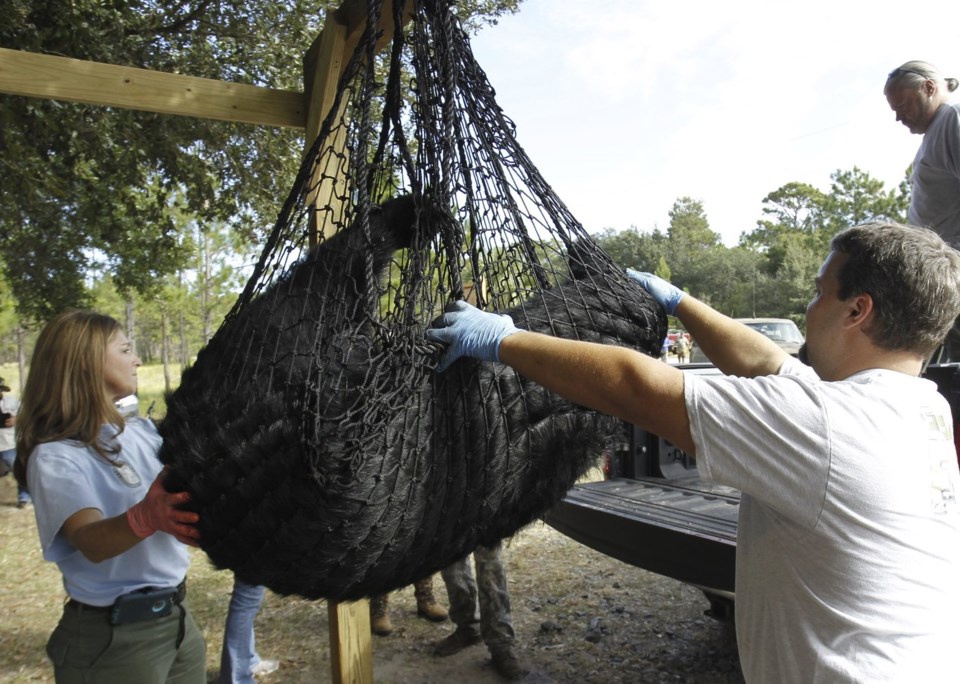ST. PETERSBURG, Fla. (AP) — The first black bear hunt in Florida in a decade will take place in December under a rule adopted Wednesday by state wildlife officials despite strong opposition to the eventual use of dogs and targeting the animals in baited locations.
The Florida Fish and Wildlife Conservation Commission voted unanimously in favor of the plan during a meeting that drew 168 people for a public hearing in the Panhandle town of Havana, with both supporters and opponents present. The panel had given preliminary approval in May, citing a need to manage growing bear populations.
“We make decisions based on science," said commission chair Rodney Barreto.
Opponents called the hunt cruel, unnecessary and an excuse for hunters to bag a trophy animal when the real issue is the encroaching human population in bear habitat as Florida continues to grow.
“Not all the hunters support this hunt. We’d like to see nature in balance," said Lauren Jorgensen, whose family owns a ranch in rural Suwannee County.
There are an estimated 4,000 black bears in Florida, one of the few states with sizable populations that do not have a bear hunting season. Several pro-hunt speakers noted that bears are much more commonly seen in many areas than in the past, causing interactions with humans that provoke fear and concern.
Ottice Amison, a member of the Franklin County Commission, said residents there report bears on porches, rooting through garbage cans, roaming neighborhoods and playgrounds.
“The reality is that the frequency and severity of bear interactions continues to rise," Amison told the wildlife commission. “Right now, too many of our residents see bears as threats and pests.”
There has been only one documented fatal black bear attack in Florida, the May mauling of 89-year-old Robert Markel and his daughter's dog in a rural part of Collier County, in southwest Florida.
The plan adopted Wednesday has more stringent rules than the previous Florida hunt in 2015, in which hunting permits were provided to anyone who could pay for them. That led to a chaotic event shut down days early after 300-plus bears were killed, including at least 38 females with cubs, meaning the young bears probably died too.
Hunt opponents predict this year will be more of the same.
“This decision reflects political pressure, not ecological necessity or public will,” said Susannah Randolph, director of the Sierra Club Florida chapter.
Under the new rule, there would be a random drawing of permits with a limit of 187. Hunters could kill only one bear each and only in certain parts of Florida where the bear population is large enough. There would be no killing of cubs and none of females with cubs, according to the FWC staff.
A permit would cost $100 for Florida residents and $300 for nonresidents.
For 2025, the plan is to hold the hunt from Dec. 6 to Dec. 28. In the future, the FWC foresees a bear hunt between Oct. 1 and Dec. 31, subject to more studies about the effect of hunting and the population of the animals. In future years, hunters could use up to six dogs each to pursue bears.
Private landowners with 5,000 acres (2,023 hectares) or more could hold what the FWC calls a “bear harvest program” on their property under the proposal. Bears could be hunted at bait feeding stations on private property. Also, bowhunting will be allowed under rules similar to those for deer.
In addition, Florida allows hunting of alligators from mid-August to November, along with year-round removal of invasive pythons from private land and designated public land managed by the FWC. The state also has an annual python challenge offering prizes and recognition for capturing pythons in the Florida Everglades.
Curt Anderson, The Associated Press




